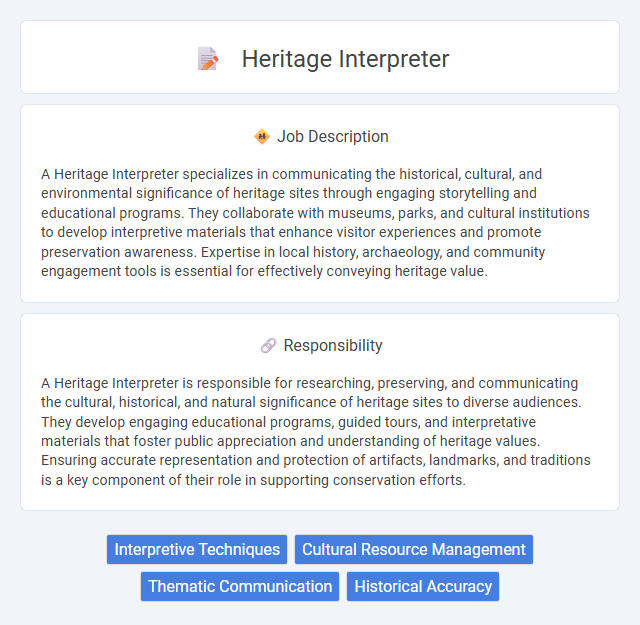
A Heritage Interpreter specializes in communicating the historical, cultural, and environmental significance of heritage sites through engaging storytelling and educational programs. They collaborate with museums, parks, and cultural institutions to develop interpretive materials that enhance visitor experiences and promote preservation awareness. Expertise in local history, archaeology, and community engagement tools is essential for effectively conveying heritage value.
Individuals with a passion for history and strong communication skills are likely suitable for a Heritage Interpreter role, as the job involves engaging diverse audiences and conveying cultural stories effectively. People who enjoy research, storytelling, and working in outdoor or historical site environments may find this role particularly fulfilling. Candidates who prefer fast-paced office settings or have limited interest in cultural heritage might be less compatible with this position.
Qualification
A Heritage Interpreter typically requires a background in history, archaeology, or cultural studies, often supported by a bachelor's degree in these fields. Strong communication skills and the ability to engage diverse audiences with storytelling techniques are essential for interpreting historical sites and cultural artifacts. Experience with public speaking, educational programming, and knowledge of local heritage preservation standards further enhance qualifications for this role.
Responsibility
A Heritage Interpreter is responsible for researching, preserving, and communicating the cultural, historical, and natural significance of heritage sites to diverse audiences. They develop engaging educational programs, guided tours, and interpretative materials that foster public appreciation and understanding of heritage values. Ensuring accurate representation and protection of artifacts, landmarks, and traditions is a key component of their role in supporting conservation efforts.
Benefit
Heritage Interpreter roles likely offer significant benefits such as enhancing public engagement by making historical and cultural stories accessible and memorable. The position may provide opportunities for continuous learning and professional growth through immersive experiences and interaction with experts. Employment in this field probably fosters a strong sense of community contribution and personal fulfillment by preserving and promoting cultural heritage.
Challenge
Heritage Interpreter roles likely involve the challenge of accurately conveying complex historical and cultural information to diverse audiences in an engaging manner. Balancing factual accuracy with storytelling could be essential to maintain visitor interest and educational value. Navigating varying audience backgrounds and expectations may require adaptability and strong communication skills.
Career Advancement
Heritage interpreter roles offer significant career advancement opportunities by enhancing expertise in cultural preservation, public education, and historical research. Professionals in this field can progress to senior interpreter positions, museum curators, or heritage site managers, leveraging specialized skills to lead educational programs and community engagement initiatives. Continuous professional development, including certification in heritage management and interpretive techniques, also supports upward mobility within cultural institutions and historical organizations.
Key Terms
Interpretive Techniques
Heritage Interpreters employ diverse interpretive techniques such as storytelling, interactive exhibits, and sensory engagement to connect visitors with historical and cultural sites. They utilize thematic narratives, multimedia tools, and hands-on activities to enhance visitor understanding and emotional connection to heritage. Effective interpretation balances factual accuracy with creative presentation to foster meaningful educational experiences.
Cultural Resource Management
Heritage Interpreters play a critical role in Cultural Resource Management by facilitating public understanding and appreciation of historical sites and artifacts. They conduct detailed research, develop educational programs, and provide guided tours that highlight the cultural significance and preservation efforts of protected locations. Their expertise ensures that heritage conservation aligns with legal frameworks and community values, promoting sustainable cultural stewardship.
Thematic Communication
Heritage interpreters specialize in thematic communication by conveying historical, cultural, and environmental narratives through engaging storytelling techniques that connect visitors with the site's significance. They utilize thematic frameworks to structure information, ensuring a coherent and memorable visitor experience that highlights key aspects such as cultural identity, historical events, and conservation efforts. Effective thematic communication by heritage interpreters enhances visitor understanding, fosters appreciation, and promotes the preservation of heritage sites.
Historical Accuracy
Heritage Interpreters ensure meticulous historical accuracy by thoroughly researching artifacts, events, and cultural contexts within heritage sites. They utilize primary sources, archival documents, and expert consultations to present authentic narratives that engage and educate visitors. Maintaining fidelity to factual history enhances the credibility of heritage interpretation and fosters public trust.
 kuljobs.com
kuljobs.com